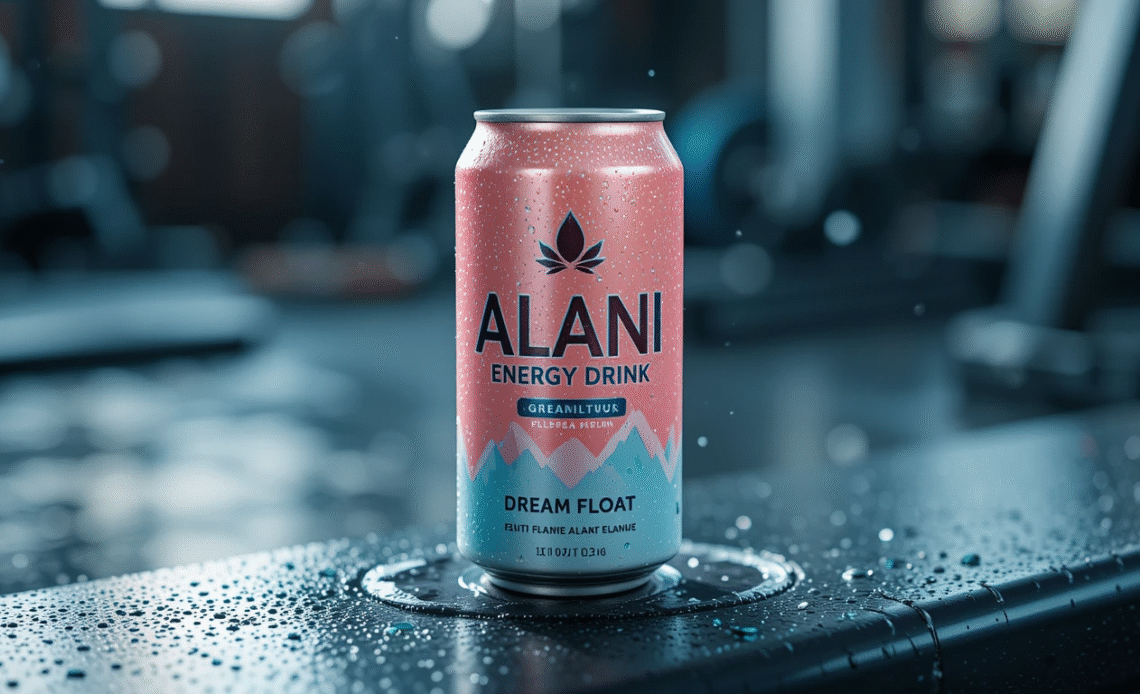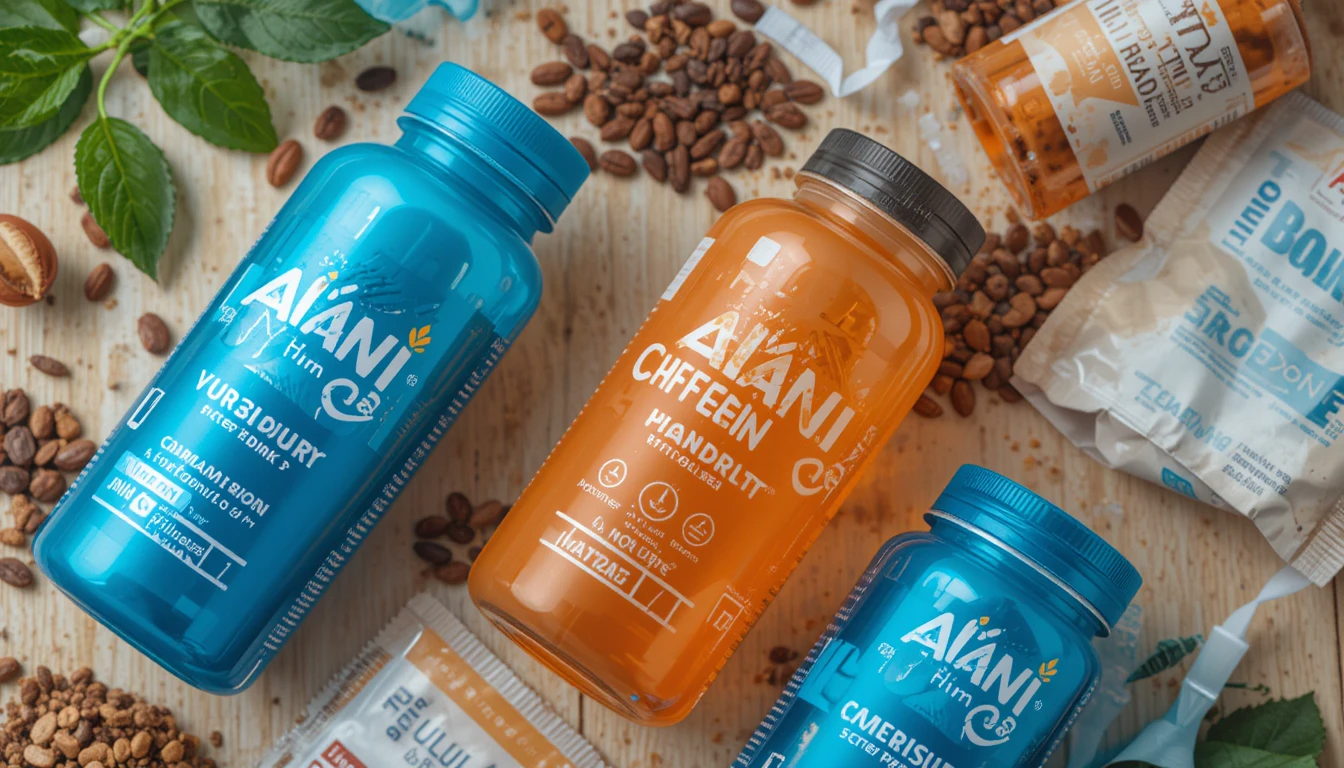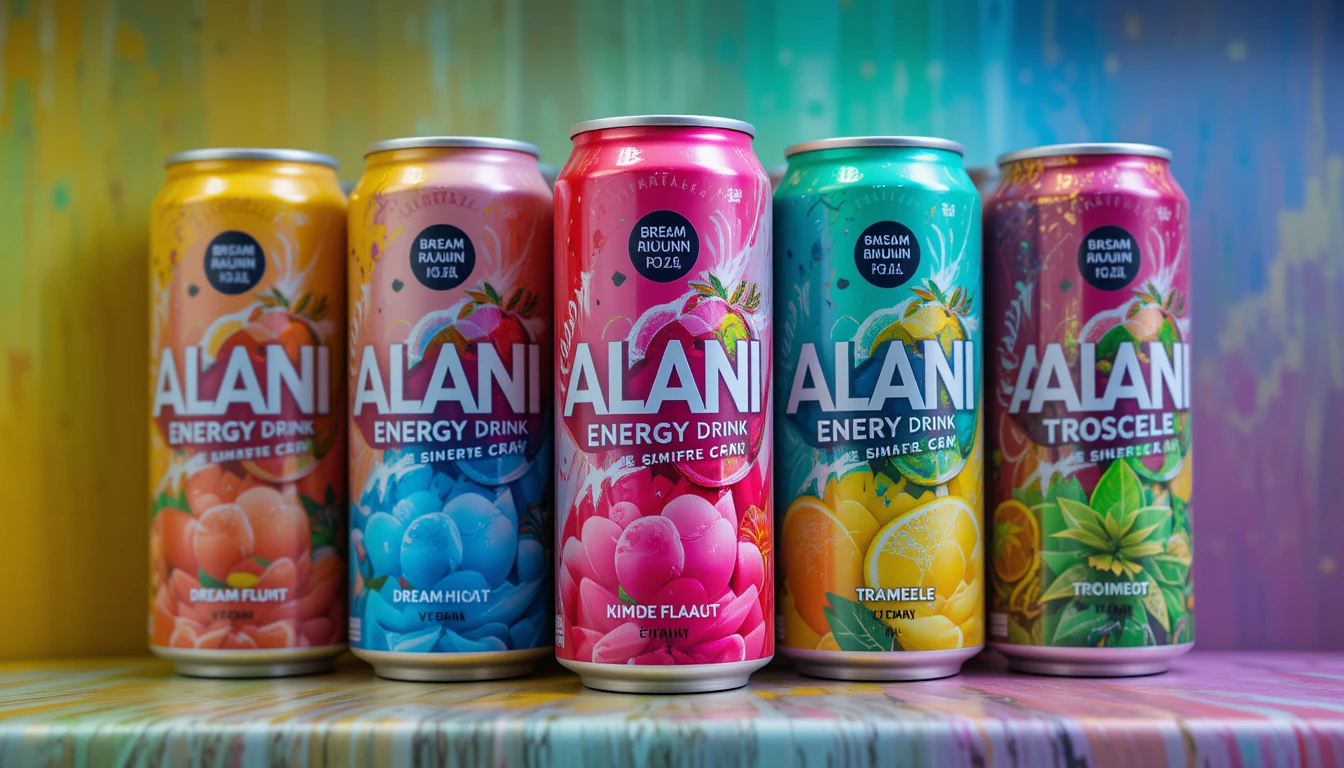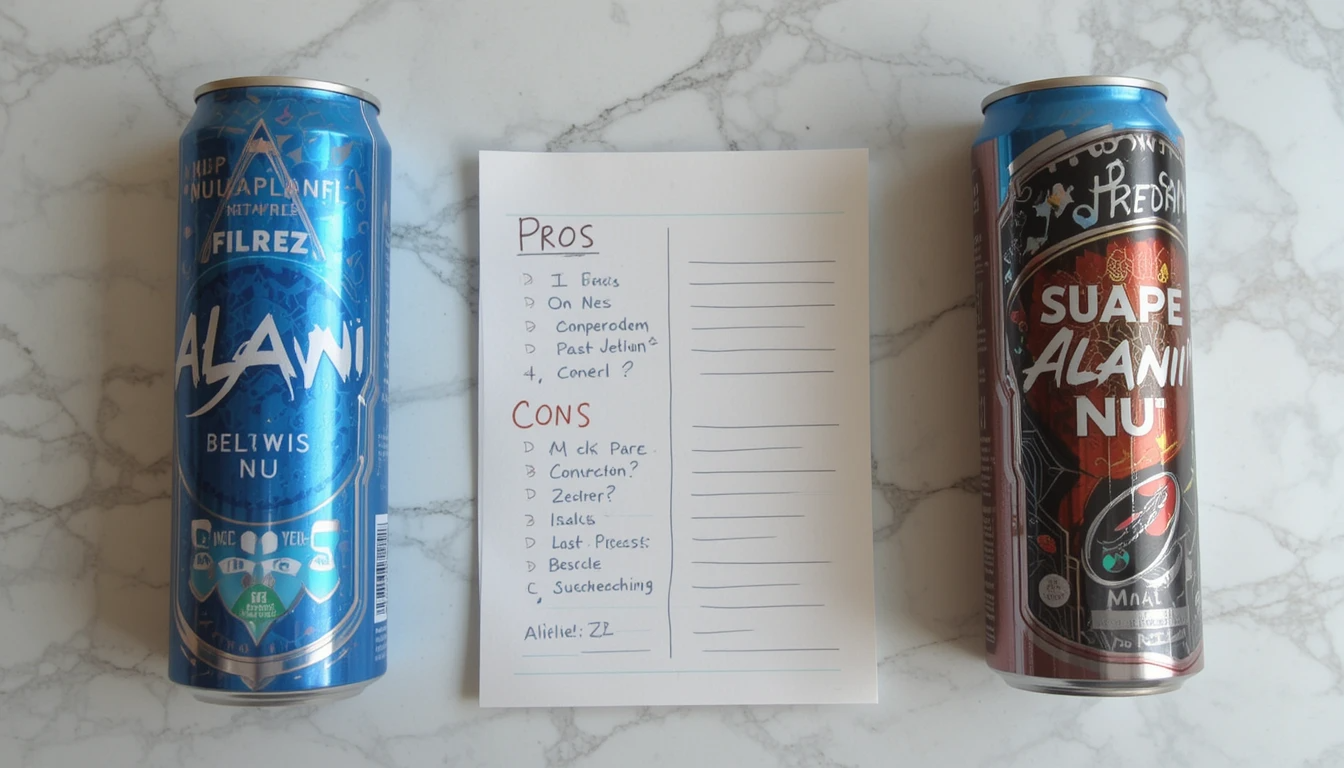
Alani Energy Drink has carved out a bright, candy-colored niche in the crowded energy drink market, appealing especially to fitness enthusiasts, influencers, and fans of aesthetically pleasing cans. But is it really the game-changer it claims to be? This in-depth article dives into everything you need to know about Alani Energy Drink—from ingredients and flavors to health comparisons and viral buzz. Whether you’re sipping Kimade, reaching for Cosmic Stardust, or wondering if this is just another Instagram trend, we’ll unpack every aspect of this brand to help you decide if it’s worth the hype.
Table of Contents
Table of Contents
Alani Energy Drink Overview
What is Alani Energy Drink?
Alani Energy Drink, formally known as Alani Nu, is a popular sugar-free beverage designed to provide a clean burst of energy. Each 12-ounce can packs 200 mg of caffeine sourced from green coffee beans, making it an ideal pre-workout boost or afternoon pick-me-up. Unlike traditional energy drinks packed with high fructose corn syrup, Alani boasts zero sugar and only 10 calories per can.
Founded in 2018 by fitness influencer and entrepreneur Katy Hearn, Alani Nu started as a supplement brand focusing on pre-workouts, protein powders, and wellness products. The energy drink line quickly became its standout product, thanks to savvy influencer marketing, eye-catching designs, and innovative flavor choices.
Alani’s mission revolves around empowering women and promoting health-focused alternatives to conventional energy drinks. With flavors ranging from Hawaiian Shaved Ice to the trendy Kimade, Alani Nu is not just selling energy—it’s selling a lifestyle.
Brand History: From Fitness Brand to Energy Hit
Alani Nu didn’t emerge from a soda lab—it was born in the gym. Katy Hearn, a certified personal trainer, created the brand to fill a gap in the female-focused supplement space. What began with BCAAs and multivitamins evolved rapidly with the launch of Alani Energy Drinks.
By 2020, the product had exploded on Instagram and TikTok, largely fueled by influencer partnerships and bright, fun packaging that contrasted with the grungy, hardcore vibes of brands like Monster or Bang.
Alani Nu partnered with celebrities and online personalities to launch limited flavors, including “Kimade,” developed in collaboration with Kim Kardashian. This flavor not only broke sales records but also cemented Alani’s presence in pop culture.
Their branding strategy is no accident. Instead of pushing hardcore gym narratives, they aim for approachable wellness. Their drinks appeal to everyone from casual gym-goers to students pulling an all-nighter.
Alani Energy Drink Ingredients Breakdown

Common Ingredients Across Flavors
Alani Energy Drink may look like a sweet soda in disguise, but its ingredient list is where the real story lies. Each can features a carefully crafted formula designed to provide energy, focus, and hydration without the sugar crash.
Here’s a breakdown of the most common ingredients found in Alani Nu energy drinks:
| Ingredient | Purpose |
|---|---|
| Caffeine (200mg) | Stimulates the central nervous system to boost alertness and energy levels |
| Sucralose | A calorie-free sweetener used instead of sugar |
| L-Theanine | Reduces the jittery effects of caffeine and promotes mental focus |
| Panax Ginseng Root Extract | Traditionally used to fight fatigue and improve brain function |
| Guarana Seed Extract | Contains natural caffeine and may help with endurance |
| B-Vitamins (B3, B6, B12) | Essential for energy production and nervous system health |
| Taurine | Supports neurological development and regulates water and mineral levels in the blood |
| Citric Acid | Adds tartness and acts as a preservative |
| Preservatives (Potassium Sorbate, Sodium Benzoate) | Extend shelf life and prevent microbial growth |
One standout is the zero sugar policy. Instead of using glucose or corn syrup, Alani opts for sucralose, a common artificial sweetener that provides the same sweet kick without the calories.
The use of L-Theanine and Ginseng also sets Alani apart from typical sugar-loaded drinks, offering cognitive support and helping reduce post-caffeine crashes. That makes it a fan favorite for students, gamers, and busy professionals.
Focus on Caffeine, Sucralose, Vitamins, and Nootropics
Let’s zoom in on the four elements that make Alani drinks functional—not just flavorful.
Caffeine: The Energy Backbone
With 200mg of caffeine per can, Alani offers a strong jolt—comparable to two cups of coffee. However, it’s not overwhelming for most consumers due to the addition of calming ingredients like L-Theanine.
For comparison:
- Alani Energy: 200mg per 12 oz
- Red Bull: 111mg per 12 oz
- Celsius: 200mg per 12 oz
This puts Alani on par with Celsius, a direct competitor often marketed as a fitness drink.
Sucralose: Sweet Without the Sugar
While the drink tastes sweet, it contains no actual sugar. Sucralose helps maintain flavor and caloric control. Unlike sugar, it doesn’t spike insulin or contribute to weight gain when consumed in moderation.
Critics sometimes raise concerns about artificial sweeteners, but the FDA deems sucralose safe. If you’re trying to reduce sugar intake, Alani is a solid pick.
B-Vitamins and Electrolytes
Every can is loaded with B vitamins—especially B12, essential for nerve health and energy metabolism. The drink also includes niacin (B3) and pyridoxine (B6), both vital for turning food into fuel. While it’s not marketed as an electrolyte drink, the inclusion of sodium and potassium helps balance hydration.
Nootropic Additions: L-Theanine and Ginseng
Unlike some energy drinks that cause jitteriness or crashes, Alani’s formula balances caffeine with nootropics like L-Theanine and Ginseng. L-Theanine promotes a calm, focused buzz. Meanwhile, Ginseng is believed to support memory, mood, and physical stamina.
Popular Flavors of Alani Energy Drink

Top-Rated Flavors and Fan Favorites
One of the biggest reasons Alani Energy Drink has soared in popularity is its vibrant, creative, and ever-expanding lineup of flavors. Unlike traditional energy drinks that stick to basic citrus or berry profiles, Alani Nu flavors read like a dessert menu—playful, nostalgic, and visually appealing.
Let’s break down some of the most talked-about flavors based on online rankings and fan feedback:
| Flavor | Flavor Profile | Best For |
|---|---|---|
| Dream Float | Orange Creamsicle float | Fans of nostalgic, creamy dessert drinks |
| Kimade | Strawberry Lemonade | Trend-followers and Kim Kardashian fans |
| Tropsicle | Pineapple with citrus popsicle | Refreshing pick-me-up on hot days |
| Juicy Peach | Sweet peach with light carbonation | Mild and smooth flavor lovers |
| Mimosa | Orange citrus fizz | Morning routines and brunch energy boost |
| Hawaiian Shaved Ice | Strawberry and fruit syrup blend | Summery and syrup-sweet drink seekers |
| Cherry Slush | Classic cherry syrup flavor | Sweet tooth satisfaction |
| Cosmic Stardust | Grape-berry fusion | Candy-like, bold flavor fans |
Dream Float is often hailed as the #1 Alani flavor, winning praise for its true-to-taste orange creamsicle vibe. It’s sweet, smooth, and not overwhelmingly carbonated—making it ideal for sipping rather than chugging.
Meanwhile, Kimade, created in partnership with Kim Kardashian, exploded on TikTok and Instagram. Its pastel pink can, celebrity branding, and light lemonade flavor made it a fast sellout and a collector’s item for fans.
Tropsicle and Juicy Peach also round out the top choices. They’re fruity without being overly sweet and tend to please a broader crowd, especially those trying Alani for the first time.
Seasonal and Limited-Edition Offerings
Alani Energy Drink doesn’t just stick to its core lineup—it regularly releases seasonal or limited-edition flavors, often themed around holidays or celebrity partnerships. These special editions keep the brand fresh and maintain buzz throughout the year.
Noteworthy seasonal offerings include:
- Witch’s Brew: A fall-exclusive caramel apple flavor in a spooky-themed can
- Orange Kiss: Light and citrusy, released during summer months
- Cherry Twist: A reimagined cherry drink with a citrus twist for spring
- Blue Slush: A winter launch with a vibrant icy aesthetic
Alani’s strategy of rotating flavors and releasing limited runs fuels a fear-of-missing-out (FOMO) effect that keeps loyal fans coming back for more. In fact, some flavors sell out so fast they end up being auctioned on reseller platforms for double the retail price.
The marketing here isn’t just about taste—it’s about collectibility and personality. Consumers are encouraged to try them all, rank their favorites, and share their reviews on TikTok and Instagram.
Alani Energy Drink Health Benefits and Concerns
Are Alani Energy Drinks Healthy?
Whether or not Alani Energy Drinks are truly healthy depends on how you define “healthy.” Are they cleaner than traditional energy drinks like Monster or Red Bull? Yes. Are they a health product like a green juice? Not exactly.
Here’s what you need to know:
✔ Pros:
- Zero sugar
Alani energy drinks are sweetened with sucralose and acesulfame potassium instead of sugar, making them a low-calorie option (only 10 calories per can). This is ideal for people managing weight or blood sugar levels. - Caffeine + L-Theanine
Alani includes 200mg of caffeine per can, balanced with L-Theanine, an amino acid known to reduce jitters and enhance focus. This duo creates smoother energy without the dreaded crash. - B-Vitamins for energy
Each can includes a healthy dose of vitamins B3, B6, and B12—all essential for converting food into energy and supporting your nervous system. - No artificial colors
Alani skips the synthetic food dyes common in many other drinks. Their vibrant designs are on the outside—not in your bloodstream.
✘ Cons:
- Artificial sweeteners
Sucralose and acesulfame K are FDA-approved but controversial. Some studies suggest potential links to gut bacteria disruption and increased cravings, though evidence remains inconclusive. - High caffeine content
At 200mg per can, it’s easy to hit your upper daily limit quickly (400mg is considered the safe max for most adults). Drinking more than one can a day? You’re pushing it. - Not suitable for everyone
Pregnant women, teens, and individuals with heart issues should avoid or limit their intake of high-caffeine beverages like Alani.
Here’s a simple breakdown of health pros and cons:
| Health Factor | Alani Nu | Notes |
|---|---|---|
| Sugar Content | 0g | Uses sucralose and acesulfame potassium |
| Calories | 10 | Low-calorie, even in flavored options |
| Caffeine per Can | 200mg | Moderate to high—equal to 2 strong coffees |
| Jitters/Crash Risk | Low | Balanced by L-Theanine |
| Vitamins | B3, B6, B12 | Good for energy metabolism and nerve function |
| Gluten-Free/No Dairy | Yes | Vegan-friendly formulation |
Nutritional Comparison with Other Drinks Like Celsius
Consumers often compare Alani to Celsius, as both are sugar-free, fitness-friendly energy drinks. Let’s look at how they stack up:
| Feature | Alani Nu | Celsius |
|---|---|---|
| Caffeine (per can) | 200mg | 200mg |
| Calories | 10 | 10 |
| Sweetener | Sucralose | Stevia + Erythritol (Original), Sucralose (in some) |
| B-Vitamins | B3, B6, B12 | B2, B3, B5, B6, B12 |
| Extra ingredients | L-Theanine, Ginseng | Ginger, Green Tea Extract |
| Carbonation | Yes | Yes |
| Best For | Flavor-focused fans | Gym-goers and athletes |
So, which is healthier?
- Celsius leans more toward the “fitness-focused” demographic with thermogenic ingredients and stevia-based sweeteners in some versions.
- Alani shines in flavor innovation and smoother stimulation (thanks to L-Theanine), but some may avoid it due to the artificial sweeteners.
The Truth About Kim Kardashian and Alani
Is Alani Owned by Kim Kardashian?
Despite the rumors and viral posts, Kim Kardashian does not own Alani Nu—but she did play a big role in one of its most successful marketing campaigns. The brand was founded by Katy Hearn, a fitness entrepreneur and social media influencer, in 2018. She created Alani Nu with a focus on wellness products made specifically for women, ranging from pre-workouts to protein powders and, of course, energy drinks.
So where does Kim Kardashian come in?
In 2023, Alani Nu partnered with Kim to release a limited-edition flavor called “Kimade.” This high-profile collaboration wasn’t just about taste—it was a branding masterclass. The pastel-colored can, sleek typography, and Kardashian’s stamp of approval turned the launch into a viral phenomenon, with cans selling out online and being flipped on resale platforms.
To clear it up:
- ✅ Kim Kardashian collaborated on the Kimade flavor
- ❌ She is not a founder or owner of Alani Nu
Her involvement was purely strategic and promotional—an example of Alani’s influencer-forward brand positioning.
Marketing Impact of the Kimade Launch
Let’s not sugarcoat it—Kimade was a cultural moment.
From unboxing videos on TikTok to shelf-clearing runs at Target and Walmart, Kimade was one of the most viral energy drink releases in recent memory. The can featured a pastel pink and lilac color palette with “Kimade” written boldly across the front, topped with her name in minimalist print: “by Kim K.”
Here’s how the campaign changed the game for Alani Nu:
| Impact Area | Effect of Kimade Launch |
|---|---|
| Brand Awareness | Massive uptick in Google searches and social media impressions |
| Sales | Record-breaking sellouts across major retailers |
| Social Proof | Alani gained status as a celebrity-endorsed lifestyle product |
| Retail Expansion | More prominent shelf space in big-box stores like Target |
| Cultural Relevance | Cemented Alani as a go-to drink for millennials and Gen Z |
Not only did this campaign spike interest in the Kimade flavor, but it drove cross-sales of other Alani flavors, supplements, and even apparel.
In short? Alani Nu didn’t just borrow Kim’s face—they adopted her branding power and turned a one-time collab into a long-term traffic booster.
Does Alani Contain Alcohol or Not?
What the Label Says About Alcohol
Let’s clear the air: Alani Energy Drinks do not contain alcohol. Despite cheeky flavor names like “Mimosa” or “Kimade,” these beverages are completely non-alcoholic. You won’t find even trace amounts of ethanol in any Alani Nu product.
Their ingredient list is straightforward—caffeine, sucralose, natural flavors, and B-vitamins. Nowhere on the can will you see “alcohol,” “ethanol,” or “fermented ingredients.” This isn’t a spiked seltzer or a ready-to-drink cocktail—it’s simply a flavored energy drink inspired by popular drinks and desserts.
So why the confusion?
Much of it comes from the naming and branding. Flavors like:
- Mimosa (a brunch staple with champagne and orange juice),
- Kimade (which sounds like a lemonade cocktail), and
- Witch’s Brew (which could pass for a Halloween punch)
… all hint at alcohol-inspired flavor profiles. But that’s where the similarity ends. These names are all about flavor inspiration, not formulation.
If you’re planning a mocktail night or just want something that tastes like a celebration without the booze, Alani is your go-to.
Misconceptions About Mimosa and Cocktail-Named Flavors
There’s a reason people do double takes when they see an Alani can.
Bright colors. Sparkling branding. Cocktail-themed names. It’s easy to mistake these drinks for something that belongs behind a bar. But those misconceptions are mostly due to three factors:
1. Flavor Naming Strategy
Names like Mimosa, Cosmic Stardust, or Cherry Slush tap into emotional flavor cues. Alani is selling an experience, not just a beverage. “Mimosa” brings brunch vibes. “Witch’s Brew” screams fall festivities. But again—zero alcohol.
2. Sleek Packaging
Each Alani can looks more like a limited-edition design from a hard seltzer company than a typical energy drink. Minimalist fonts, pastels, fruit doodles—it’s grown-up bubbly without the buzz.
3. Social Media Aesthetics
Influencers love showcasing Alani drinks as part of their lifestyle shots—poolside, gym selfies, or “Friday vibes.” These kinds of posts sometimes imply celebration, which may unintentionally confuse consumers into thinking it’s alcoholic.
But let’s be clear: Alani Nu is caffeine-forward, not alcohol-infused. It gives you a lift without the buzz, hangover, or ID check.
Comparing Alani with Other Energy Brands
Alani vs Celsius: Which Is Healthier?
When it comes to energy drinks marketed as “better-for-you,” Alani Nu and Celsius dominate the conversation. Both brands promise clean ingredients, functional benefits, and sleek, modern branding—but how do they really compare?
Let’s take a look at their nutritional face-off:
| Feature | Alani Nu | Celsius |
|---|---|---|
| Caffeine | 200mg per 12oz can | 200mg per 12oz can |
| Calories | 10 | 10 |
| Sugar | 0g (uses sucralose) | 0g (stevia + erythritol or sucralose) |
| Vitamins | B3, B6, B12 | B2, B3, B5, B6, B7, B12 |
| Sweeteners | Sucralose, acesulfame potassium | Stevia, erythritol (original line) |
| Nootropics | L-Theanine, Panax Ginseng | Ginger extract, green tea extract |
| Flavors | Dessert- and cocktail-inspired | Citrus-forward and sporty |
| Best For | Taste & lifestyle aesthetic | Fitness enthusiasts & pre-workout boost |
So, which is healthier?
- Celsius leans more into functional fitness, with added green tea extract and ginger for thermogenic benefits.
- Alani, on the other hand, feels more lifestyle-focused, offering indulgent flavors like “Dream Float” and “Cherry Slush” with no sugar or crash.
If you’re strict about natural sweeteners, Celsius Original Line wins. But if flavor variety and taste experience matter most, Alani Nu takes the crown.
Taste, Price, and Ingredients Showdown
Let’s break it down even further:
Taste
Alani wins here, hands down. With flavors like “Mimosa,” “Juicy Peach,” and “Sherbet Swirl,” Alani doesn’t just give you energy—it makes your taste buds dance. Celsius plays it safer with citrus, cola, and berry tones that feel more utilitarian.
Verdict: Alani if you want flavor creativity, Celsius for straightforward refreshment.
Price
Both typically retail between $2.00–$2.50 per can depending on the store. However, Celsius is more widely available in bulk packs at wholesale clubs like Costco or Sam’s Club, which can make it slightly more affordable per can.
Verdict: Tie, though Celsius may offer better bulk deals.
Functional Ingredients
Celsius leans into thermogenic properties, meaning it aims to boost your metabolism. Its blend of green tea, ginger, and guarana can help burn calories during exercise. Alani Nu focuses more on mental clarity and mood, thanks to L-Theanine and Ginseng.
Verdict: Celsius for fat burn, Alani for mood and flavor.
Here’s a simplified recommendation guide:
| If you’re looking for… | Choose |
|---|---|
| Bold, sweet, fun flavors | Alani |
| Natural sweeteners like stevia | Celsius |
| Pre-workout fat-burning benefits | Celsius |
| Social media-friendly branding | Alani |
| Less acidic taste profile | Alani |
| Long shelf-stable variety packs | Celsius |
Where to Buy Alani Energy Drinks

Online vs Retail: Best Spots to Grab a Can
Alani Energy Drinks are widely available across the U.S., both online and in retail stores. Whether you prefer to stock up from your couch or pick up a single can on-the-go, here are your best options:
Online Stores
Shopping online gives you access to Alani’s full lineup—including seasonal flavors and exclusive drops. Here’s where you can find them:
- AlaniNu.com – The official site often releases limited editions first and offers bundles, merchandise, and discounts.
- Amazon – Known for convenience and Prime shipping, Amazon offers multi-packs and variety packs.
- GNC / Vitamin Shoppe – These fitness-focused retailers sell both in-store and online, sometimes offering flavor-exclusive deals.
Tip: If you’re chasing a sold-out seasonal flavor like Kimade, Amazon and eBay may be your only hope—but expect a mark-up.
Retail Stores
Want to grab a can immediately? These national chains often carry Alani Nu in their beverage sections:
- Target – Most Target stores stock multiple flavors in single cans and 4-packs.
- Walmart – Affordable pricing and a wider flavor range make Walmart a solid option.
- Kroger, Publix, Meijer – Many regional grocery stores carry Alani Nu in the health and fitness aisle.
- Convenience Stores – Select flavors are showing up at gas stations and quick marts near colleges and fitness centers.
Pro Tip: Some flavors are store exclusives (e.g., certain Target or Walmart-only cans), so shop around if you want the full flavor tour.
Want a tasty treat to go with your Alani Nu while shopping? Check out our protein-ice-cream-recipes for a healthy dessert pairing.
Subscription Options and Promotions
If you drink Alani on the regular (guilty!), signing up for a subscription may save you time and money.
AlaniNu.com Subscription Perks:
- 10–15% off recurring orders
- Customize your box with your favorite flavors
- Pause, skip, or cancel anytime
- Early access to limited flavors
Bundle Deals also help reduce the per-can cost—especially if you’re mixing energy drinks with Alani’s pre-workouts or protein bars.
Promotions & Sales to Watch:
- BOGO deals at GNC and Vitamin Shoppe
- Target Circle and Walmart Rollbacks
- Holiday drops (Halloween, Summer, Valentine’s Day releases sell fast)
User Reviews and Real Consumer Opinions
What Customers Are Saying About Alani
From viral TikTok hauls to Reddit flavor debates, Alani Energy Drink has sparked thousands of real consumer reviews—and they’re not holding back. Whether fans are praising the clean buzz or critiquing a flavor flop, the feedback paints a clear picture of a brand that’s made a real impact.
Here are some recurring themes in user reviews:
Flavor Variety is a Major Win
Most fans agree: Alani’s flavor lineup is unmatched in the energy drink world. Popular picks like Dream Float, Kimade, and Tropsicle constantly receive 4- and 5-star ratings for their candy-like, soda-inspired taste without the crash.
“It’s like drinking a dessert without the guilt. Dream Float is my GOAT.” – Amazon Review
“Kimade tastes like strawberry lemonade and it’s light, not overpowering. I buy it in bulk.” – TikTok user @CaffeinatedCarla
Great for the Gym, Office, or Study Sessions
The smooth energy (thanks to L-Theanine) makes Alani a top pick among fitness fans and students. Many note that the caffeine boost feels steady—not jittery or overwhelming.
“Unlike Bang or Monster, I don’t get the shakes. I can lift AND focus.” – Reddit user u/PreWorkoutDad
“Perfect for 3pm work slumps. Doesn’t crash me like coffee does.” – GNC Verified Buyer
Social Media Buzz and Influencer Takes
Alani’s rise to fame wasn’t just from word-of-mouth—it was engineered through Instagram aesthetics and TikTok trends. Influencers in the fitness, beauty, and lifestyle niches frequently include Alani cans in morning routines, gym bags, or car cup holders.
Notable influencer moments:
- Claudia Walsh and Fitness TikTok creators showcasing flavor taste tests
- “Alani haul” videos with followers ranking their top 5 picks
- Alani x Kim Kardashian collab created a wave of reaction videos and memes
Even casual drinkers got in on the action. The eye-catching cans and photogenic design made it perfect for Instagram Stories and #WhatI’mDrinking posts.
But not all feedback is glowing.
The Criticism: Too Sweet or Too Artificial?
A portion of reviewers find some flavors a little too close to soda—sweet, intense, and artificial.
“Some flavors taste like candy syrup. Wish they used more natural sweeteners.” – Honest review from Influenster
“Cherry Slush was a pass for me. It’s just too sugary tasting, even without the sugar.” – Amazon 2-star review
The use of sucralose and acesulfame potassium (artificial sweeteners) remains controversial among clean-label shoppers. Those who prefer natural ingredients often lean toward competitors like Celsius Original, which uses stevia and green tea extracts.
Overall Consensus?
Alani isn’t just another energy drink—it’s a vibe.
People love it for the taste, the energy without the crash, and the brand’s social media presence. It may not win over every health purist, but it has clearly built a loyal and energetic fan base.
Conclusion: Should You Try Alani Energy Drink?
Alani Energy Drink isn’t just an energy booster—it’s a brand that blends flavor, function, and flair into every can. Whether you’re looking for a sugar-free pick-me-up before your workout, a midday caffeine fix, or just something new and exciting to sip on, Alani delivers with style.
From standout flavors like Dream Float and Kimade, to its clean energy profile with 200mg caffeine, no sugar, and added L-Theanine, Alani offers more than just taste—it offers experience. The brand’s tight grip on pop culture, influencer appeal, and collector-worthy can designs makes it one of the most recognizable names in energy drinks today.
But is it for everyone? Not quite. If you’re sensitive to artificial sweeteners or high doses of caffeine, this might not be your daily go-to. But for most people looking for a fun, effective, and Instagrammable energy drink, Alani is a clear contender.
For more recipes follow mw in Facebook and Pinterest.
FAQ Section: Frequently Asked Questions About Alani Energy Drink
Are Alani energy drinks healthy?
Alani energy drinks are considered a healthier alternative to traditional sugary energy drinks. They’re:
Zero sugar
Low calorie (10 calories per can)
Enriched with B-vitamins
Made with no artificial coloring
However, they do contain artificial sweeteners (sucralose) and 200mg of caffeine, which may not suit everyone—especially if you’re caffeine-sensitive or trying to avoid synthetic ingredients. They’re a solid option for energy without the sugar crash, but moderation is key.
Is Alani owned by Kim Kardashian?
No, Kim Kardashian is not the owner of Alani Energy. The brand was founded by Katy Hearn, a fitness influencer and entrepreneur. However, Kim collaborated with Alani Nu to launch a limited-edition flavor called “Kimade”, which helped boost the brand’s visibility and popularity. She was the face of the campaign—not the business owner.
Does Alani have alcohol?
No. Despite cocktail-themed names like “Mimosa” or “Kimade,” Alani Energy Drinks are 100% non-alcoholic. They do not contain ethanol or any fermented ingredients. These are purely energy-enhancing beverages designed for focus, stamina, and refreshment—not intoxication.
Which is healthier, Celsius or Alani?
Both are strong contenders for “healthier energy drinks,” but they differ in focus:
Celsius emphasizes fat-burning with thermogenic ingredients (green tea, ginger) and sometimes natural sweeteners like stevia.
Alani prioritizes fun flavors and mood balance with ingredients like L-Theanine and Ginseng, using sucralose for sweetness.
If you want natural and performance-driven, Celsius might be better. If you prioritize flavor and smoother stimulation, Alani is your go-to.
